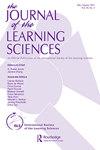Learning sciences and learning engineering: A natural or artificial distinction?
IF 3.9
1区 教育学
Q1 EDUCATION & EDUCATIONAL RESEARCH
引用次数: 3
Abstract
ABSTRACT “Learning engineering” has gained popularity as a term connected to the work of learning sciences. However, the nature of that connection is not entirely clear. For some, learning engineering represents distinct, industry-inspired practices enabled by data abundance and digital platformization of learning technologies. That view is presented as one where learning engineers apply learning research that has resided in experimental studies. For others, learning engineering should refer to the use of the full breadth of knowledge developed within the learning sciences research community. This second view is more inclusive of the fundamentally situated, design-oriented, and real-world commitments that are the backbone of the learning sciences, as reflected in this journal. The two views differ even as far as whether the academic field is labeled “learning science” or “learning sciences”. This article examines and articulates these differences. It also argues that without course correction, many who identify with learning engineering will conduct technology-supported learning improvement work that, at its own risk, will neglect the full and necessary scope of what has already been and continues to be discovered in the learning sciences. Moreover, it behooves all to consider recently elevated, but deeply fundamental questions being asked in the learning sciences about what is important to learn and toward what ends. With some more clarity around what is actually encompassed by the learning sciences and how all interested in design and educational improvement can build upon that knowledge, we can make greater collective progress to understanding and supporting human learning.学习科学和学习工程:自然的还是人为的区别?
“学习工程”作为一个与学习科学工作相关的术语而越来越受欢迎。然而,这种联系的本质并不完全清楚。对于一些人来说,学习工程代表着独特的、受行业启发的实践,这些实践是由数据丰富和学习技术的数字平台化实现的。这种观点被认为是学习工程师应用于实验研究中的学习研究。对于其他人来说,学习工程应该指的是在学习科学研究社区内开发的知识的全部广度的使用。第二种观点更多地包含了作为学习科学支柱的基本定位、以设计为导向和现实世界的承诺,正如本刊所反映的那样。这两种观点甚至在学术领域是否被贴上“学习科学”或“学习科学”的标签上也存在分歧。本文研究并阐明了这些差异。它还认为,如果不进行课程修正,许多认同学习工程的人将进行技术支持的学习改进工作,这将在其自身的风险下,忽视在学习科学中已经发现和继续发现的全部和必要的范围。此外,所有人都有必要考虑最近在学习科学中提出的一些高度但又非常基本的问题:学习什么是重要的,为了什么目的。随着学习科学实际包含的内容更加清晰,以及所有对设计和教育改进感兴趣的人如何在这些知识的基础上建立起来,我们可以在理解和支持人类学习方面取得更大的集体进步。
本文章由计算机程序翻译,如有差异,请以英文原文为准。
求助全文
约1分钟内获得全文
求助全文
来源期刊

Journal of the Learning Sciences
Multiple-
CiteScore
10.70
自引率
5.30%
发文量
17
期刊介绍:
Journal of the Learning Sciences (JLS) is one of the two official journals of the International Society of the Learning Sciences ( www.isls.org). JLS provides a multidisciplinary forum for research on education and learning that informs theories of how people learn and the design of learning environments. It publishes research that elucidates processes of learning, and the ways in which technologies, instructional practices, and learning environments can be designed to support learning in different contexts. JLS articles draw on theoretical frameworks from such diverse fields as cognitive science, sociocultural theory, educational psychology, computer science, and anthropology. Submissions are not limited to any particular research method, but must be based on rigorous analyses that present new insights into how people learn and/or how learning can be supported and enhanced. Successful submissions should position their argument within extant literature in the learning sciences. They should reflect the core practices and foci that have defined the learning sciences as a field: privileging design in methodology and pedagogy; emphasizing interdisciplinarity and methodological innovation; grounding research in real-world contexts; answering questions about learning process and mechanism, alongside outcomes; pursuing technological and pedagogical innovation; and maintaining a strong connection between research and practice.
 求助内容:
求助内容: 应助结果提醒方式:
应助结果提醒方式:


